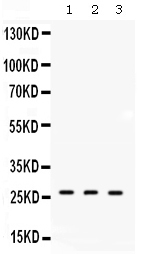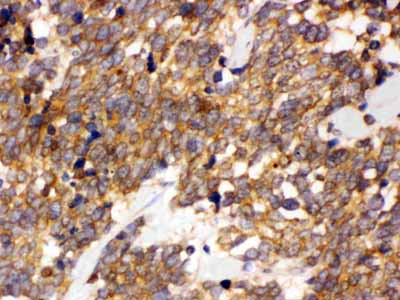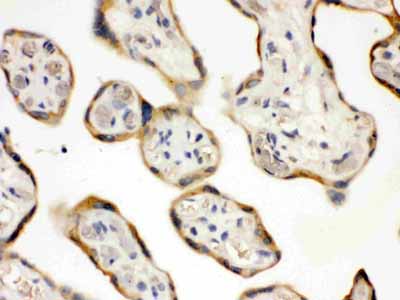Anti-DDAH2 Picoband Antibody
- SPECIFICATION
- CITATIONS
- PROTOCOLS
- BACKGROUND

Application
| WB, IHC-P |
|---|---|
| Primary Accession | O95865 |
| Host | Rabbit |
| Reactivity | Human, Mouse, Rat |
| Clonality | Polyclonal |
| Format | Lyophilized |
| Description | Rabbit IgG polyclonal antibody for N(G),N(G)-dimethylarginine dimethylaminohydrolase 2(DDAH2) detection. Tested with WB, IHC-P in Human;Mouse;Rat. |
| Reconstitution | Add 0.2ml of distilled water will yield a concentration of 500ug/ml. |
| Gene ID | 23564 |
|---|---|
| Other Names | N(G), N(G)-dimethylarginine dimethylaminohydrolase 2, DDAH-2, Dimethylarginine dimethylaminohydrolase 2, 3.5.3.18, DDAHII, Dimethylargininase-2, Protein G6a, S-phase protein, DDAH2, DDAH, G6A, NG30 |
| Calculated MW | 29644 MW KDa |
| Application Details | Immunohistochemistry(Paraffin-embedded Section), 0.5-1 µg/ml, Human, By Heat Western blot, 0.1-0.5 µg/ml, Human, Mouse, Rat |
| Subcellular Localization | Cytoplasm . Mitochondrion . Translocates from cytosol to mitochondrion upon IL-1beta stimulation in chondrocytes. |
| Tissue Specificity | Detected in heart, placenta, lung, liver, skeletal muscle, kidney and pancreas, and at very low levels in brain. . |
| Protein Name | N(G),N(G)-dimethylarginine dimethylaminohydrolase 2 |
| Contents | Each vial contains 5mg BSA, 0.9mg NaCl, 0.2mg Na2HPO4, 0.05mg NaN3. |
| Immunogen | A synthetic peptide corresponding to a sequence at the C-terminus of human DDAH2 (190-224aa DAAQKAVRAMAVLTDHPYASLTLPDDAAADCLFLR), different from the related mouse and rat sequences by three amino acids. |
| Purification | Immunogen affinity purified. |
| Cross Reactivity | No cross reactivity with other proteins |
| Storage | At -20˚C for one year. After r˚Constitution, at 4˚C for one month. It˚Can also be aliquotted and stored frozen at -20˚C for a longer time.Avoid repeated freezing and thawing. |
| Name | DDAH2 (HGNC:2716) |
|---|---|
| Synonyms | DDAH, G6A, NG30 |
| Function | Putative hydrolase with unknown substrate (Probable). Does not hydrolyze N(G),N(G)-dimethyl-L-arginine (ADMA) which acts as an inhibitor of NOS (PubMed:21493890, PubMed:37296100). In endothelial cells, induces expression of vascular endothelial growth factor (VEGF) via phosphorylation of the transcription factor SP1 by PKA in a process that is independent of NO and NO synthase (By similarity). Similarly, enhances pancreatic insulin secretion through SP1-mediated transcriptional up-regulation of secretagogin/SCGN, an insulin vesicle docking protein (By similarity). Upon viral infection, relocates to mitochondria where it promotes mitochondrial fission through activation of DNM1L leading to the inhibition of innate response activation mediated by MAVS (PubMed:33850055). |
| Cellular Location | Cytoplasm. Mitochondrion Note=Translocates from cytosol to mitochondrion upon IL1B stimulation in chondrocytes |
| Tissue Location | Detected in heart, placenta, lung, liver, skeletal muscle, kidney and pancreas, and at very low levels in brain |

Thousands of laboratories across the world have published research that depended on the performance of antibodies from Abcepta to advance their research. Check out links to articles that cite our products in major peer-reviewed journals, organized by research category.
info@abcepta.com, and receive a free "I Love Antibodies" mug.
Provided below are standard protocols that you may find useful for product applications.
Background
DDAH2 is known as dimethylarginine dimethylaminohydrolase 2 which is mapped to 6p21.3 by radiation hybrid and FISH analysis. This gene encodes a dimethylarginine dimethylaminohydrolase. DDAH2 functions in nitric oxide generation by regulating the cellular concentrations of methylarginines, which in turn inhibit nitric oxide synthase activity. The protein may be localized to the mitochondria. Alternative splicing resulting in multiple transcript variants.
If you have used an Abcepta product and would like to share how it has performed, please click on the "Submit Review" button and provide the requested information. Our staff will examine and post your review and contact you if needed.
If you have any additional inquiries please email technical services at tech@abcepta.com.













 Foundational characteristics of cancer include proliferation, angiogenesis, migration, evasion of apoptosis, and cellular immortality. Find key markers for these cellular processes and antibodies to detect them.
Foundational characteristics of cancer include proliferation, angiogenesis, migration, evasion of apoptosis, and cellular immortality. Find key markers for these cellular processes and antibodies to detect them. The SUMOplot™ Analysis Program predicts and scores sumoylation sites in your protein. SUMOylation is a post-translational modification involved in various cellular processes, such as nuclear-cytosolic transport, transcriptional regulation, apoptosis, protein stability, response to stress, and progression through the cell cycle.
The SUMOplot™ Analysis Program predicts and scores sumoylation sites in your protein. SUMOylation is a post-translational modification involved in various cellular processes, such as nuclear-cytosolic transport, transcriptional regulation, apoptosis, protein stability, response to stress, and progression through the cell cycle. The Autophagy Receptor Motif Plotter predicts and scores autophagy receptor binding sites in your protein. Identifying proteins connected to this pathway is critical to understanding the role of autophagy in physiological as well as pathological processes such as development, differentiation, neurodegenerative diseases, stress, infection, and cancer.
The Autophagy Receptor Motif Plotter predicts and scores autophagy receptor binding sites in your protein. Identifying proteins connected to this pathway is critical to understanding the role of autophagy in physiological as well as pathological processes such as development, differentiation, neurodegenerative diseases, stress, infection, and cancer.




